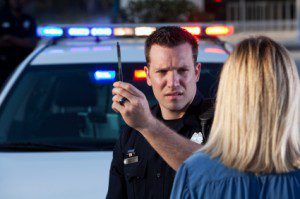 At one point we have all likely had to drive through a police checkpoint. Even if you are not doing anything wrong it can still be a nerve-racking experience wondering if the officer will issue a ticket to you for something maybe you didn’t know was wrong. Usually police can only stop you in your vehicle if they have reasonable suspicion or probable cause to believe you are breaking the law. The checkpoint appears to defy this principle of search and seizure law by allowing police to randomly stop vehicles to look for a possible crime being committed. The law allows an exception for police to be able to set up these checkpoints as long as they meet certain guidelines, although the notion of being able to randomly stop vehicles without cause may seem to be overly intrusive.
At one point we have all likely had to drive through a police checkpoint. Even if you are not doing anything wrong it can still be a nerve-racking experience wondering if the officer will issue a ticket to you for something maybe you didn’t know was wrong. Usually police can only stop you in your vehicle if they have reasonable suspicion or probable cause to believe you are breaking the law. The checkpoint appears to defy this principle of search and seizure law by allowing police to randomly stop vehicles to look for a possible crime being committed. The law allows an exception for police to be able to set up these checkpoints as long as they meet certain guidelines, although the notion of being able to randomly stop vehicles without cause may seem to be overly intrusive.
Likely one of the most common checkpoints police will strategically set up is the DWI checkpoint. Police must submit guideline as to where the checkpoint will take place and the method they will be using to decide which vehicles to investigate. Generally police must have a pattern in place to stop vehicles such as they will stop every 7th vehicle or possibly will stop all vehicles. While coming up upon one of these checkpoints makes nearly everyone at least a little nervous, it is better to drive through the checkpoint if you are already upon it rather than to try to turn around and avoid it. In North Carolina police may pull you over if they see you try to avoid a checkpoint even if you are not committing a crime. So if you should come upon a checkpoint and you are within view of the police it is better to drive through the checkpoint and try your best to remain calm.